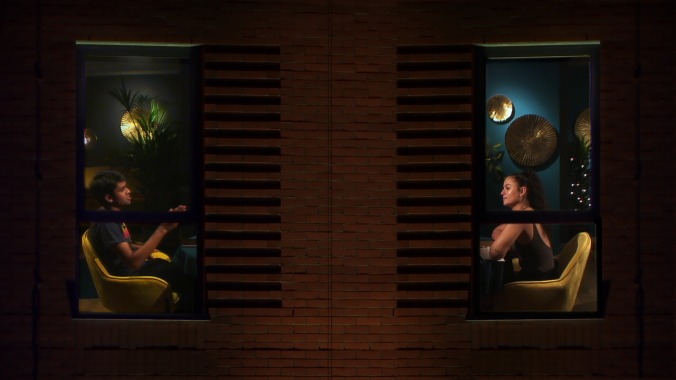Everyone should accept The Circle’s friend request

Forget the cautionary tales of yore: Online duplicity is actually ridiculously fun.
Let me back up just a tad: Earlier this month, Netflix premiered a new competitive reality three-week event, The Circle. Based on the British reality series of the same name, contestants become temporary tenants of an aggressively modern apartment building where they communicate solely through a dedicated social media platform. Cloaked by sweet, sweet anonymity, the level of authenticity among the participants ranges from painfully earnest, like virtual reality engineer Shubham Goel, to full-blown catfish in the case of Seaburn Williams, who chooses to masquerade as his girlfriend, Rebecca. Through careful strategy (read: clunky flirtation, in most scenarios), the players must garner enough popularity to become the “influencers” who ultimately determine the trajectory of the game. The least ineffectual among them are at risk of being sent home, or “blocked,” while the last user standing takes home $100,000. Host and comedian Michelle Buteau adds an energy that is the virtual equivalent of a good friend watching along with a bowl of popcorn.
It’s very easy to initially align the competition with the innate shallowness of social media culture, especially when chats are limited to measured pleasantries and quippy hashtags. In many ways, it’s a reflection of how so many of us navigate online spaces in an effort to make some connection: tossing in an unassuming emoji here, an “LOL” there, all in an effort to repackage ourselves into something palatable enough to not risk being ostracized. Even someone like Sammie, an outspoken, naturally engaging bombshell from Miami, isn’t immune to calculated responses and a well-placed smiley face. Part of that is strategy, but that proficiency stems from learning how to maintain even the most tenuous connections online.
More importantly: Without the benefit of in-person influence, The Circle evens the veritable playing field in a way that other reality shows cannot. Case in point: A competitor like Alana—a bubbly, attractive swimsuit model from Texas—isn’t able to benefit from the same inherent bias that would likely carry her through multiple rounds. In fact, Alana actually has to work to convince her Circlemates that she’s a real person (a feat made difficult by the fact that she’s a model, which she mentions, uh, more than once). And when it’s not a carousel of harmless deceit and half-baked alliances, the show serves as a pertinent social experiment when you consider just who feels the need to conceal their identity in order to gain an advantage—most likely the most marginalized among them. Similarly to what MTV’s Catfish has accomplished for years, The Circle wades through the gray areas of online authenticity and pinpoints the reasons a person may be hesitant to present their true selves on the world wide web, whether they want to avoid persistent trolling as a plus-size individual or would rather explore the spectrum of gender without limitations. For some, “be yourself” is a pretty costly platitude, even when a hundred grand isn’t on the line.
But if you’re not exactly looking for an introspective examination of how we behave in digital spaces, that’s totally fine. The Circle is, in large part, just indulgent, unrestrained fun with enough hairpin turns to shirk predictability. Status updates have never been quite this enthralling.